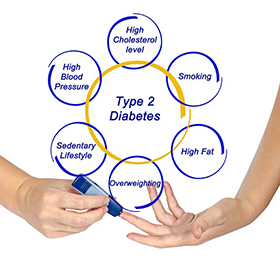
Despite what we are often told the overwhelming evidence shows that Type 2 diabetes is a diet and lifestyle illness. It also shows that when you reverse the conditions that caused it the disease is also reversible.
Type 2 diabetes (T2D) is a chronic disease closely linked to the epidemic of obesity that requires long-term medical attention to limit the development of its wide range of complications. Many of these complications arise from the combination of resistance to insulin action, inadequate insulin secretion, and excessive or inappropriate glucagon secretion. Approximately 10% of the population of the USA and Canada have a diagnosis of T2D, and the morbidity and mortality rates associated with it are fairly high. The economic burden of T2D in the USA is $245 billion and around $20 billion in Australia.
This case documents three patients referred to the Intensive Dietary Management clinic in Toronto, Canada, for insulin-dependent type 2 diabetes. It demonstrates the effectiveness of therapeutic fasting to reverse their insulin resistance, resulting in cessation of insulin therapy while maintaining control of their blood sugars. In addition, these patients were also able to lose significant amounts of body weight, reduce their waist circumference and also reduce their glycated haemoglobin level.
These three cases exemplify that therapeutic fasting may reduce insulin requirements in T2D. Given the rising cost of insulin, patients may potentially save significant money. Further, the reduced need for syringes and blood glucose monitoring may reduce patient discomfort.
Therapeutic fasting has the potential to fill this gap in diabetes care by providing similar intensive caloric restriction and hormonal benefits as bariatric surgery without the invasive and dangerous surgery. During fasting periods, patients are allowed to drink unlimited amounts of very low-calorie fluids such as water, coffee, tea and bone broth. A general multivitamin supplement is encouraged to provide adequate micronutrients. Precise fasting schedules vary depending primarily on the patient’s preference, ranging from 16 hours to several days. On eating days, patients are encouraged to eat a diet low in sugar and refined carbohydrates, which decreases blood glucose and insulin secretion.
This means that patients with T2D can reverse their diseases without the worry of side effects and financial burden of many pharmaceuticals, as well as the unknown long-term risks and uncertainty of surgery, all by means of therapeutic fasting.
Source:
http://casereports.bmj.com/content/2018/bcr-2017-221854.full